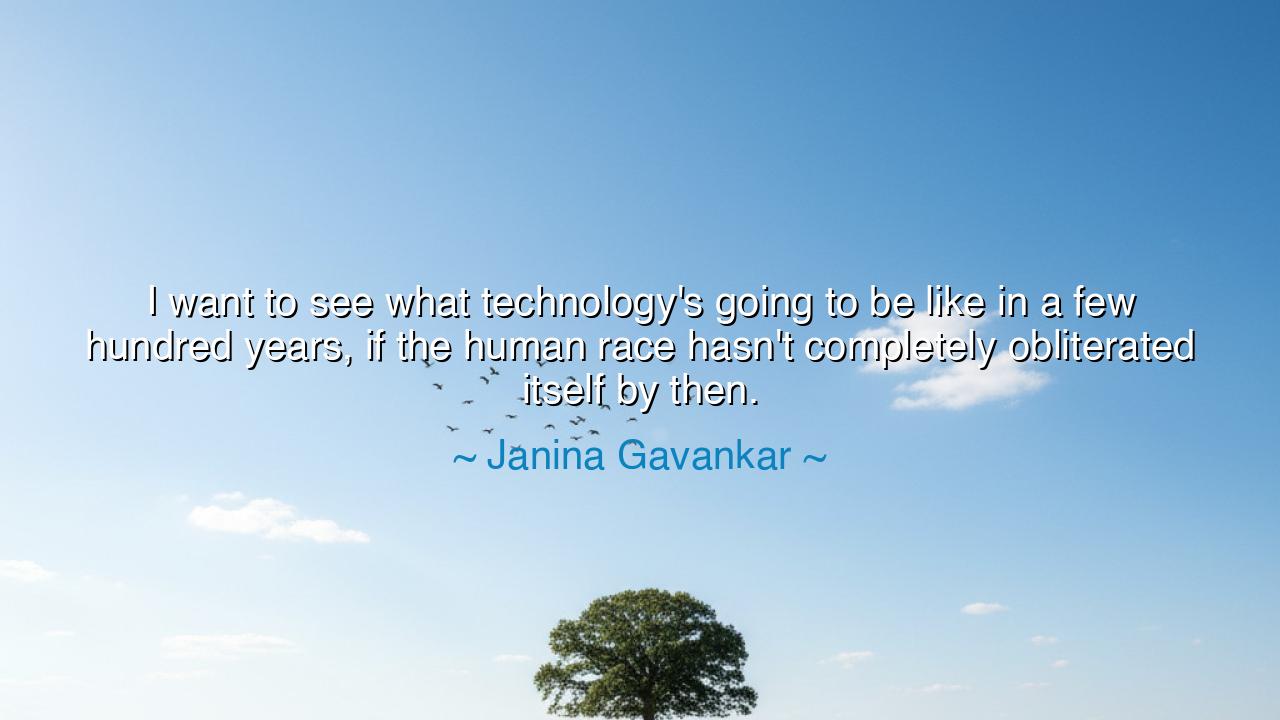
I want to see what technology's going to be like in a few
I want to see what technology's going to be like in a few hundred years, if the human race hasn't completely obliterated itself by then.






Hear the words of Janina Gavankar, spoken with both wonder and warning: “I want to see what technology’s going to be like in a few hundred years, if the human race hasn’t completely obliterated itself by then.” In this single breath she captures the paradox of our age: the awe of progress and the fear of destruction. For every invention that lifts humanity higher carries also the shadow of peril, and the very tools that promise salvation may, if wielded without wisdom, bring about ruin.
When Gavankar speaks of her longing to see the technology of centuries to come, she gives voice to the eternal human desire to peer beyond the veil of time. We are a species of dreamers, forever reaching for what lies ahead—curious about the worlds our children’s children may inherit, fascinated by the marvels yet to be born of science and imagination. From the first fire lit in a cave to the spacecraft that journey beyond the stars, humanity has always yearned to know: what next?
Yet her words carry also a shadow—the fear that the human race may not endure to see such wonders. For history has shown us again and again that the same mind which invents can also destroy. The harnessing of the atom brought light to cities and power to nations, but it also birthed the bomb that could annihilate all life in a moment. The rise of industry brought wealth and invention, but it also scarred the earth and poisoned the air. Here lies the warning: without wisdom, technology can become a weapon of self-obliteration.
Consider the tale of Oppenheimer and the Manhattan Project. Scientists who sought knowledge for its own sake unlocked a force that could level entire cities. In that moment, humanity stood at a crossroads: to use this new power for peace, or for destruction. The world trembled, for never before had man’s inventions given him the power to destroy himself so swiftly. This is the same warning Gavankar echoes—our greatest danger is not the tool itself, but our own capacity to misuse it.
And yet, her words are not despairing—they are filled with wonder. She yearns to see what humanity might create if it survives. Perhaps medicine that heals all disease, perhaps machines that rebuild ecosystems, perhaps journeys to stars we now only glimpse. The potential of technology is limitless, and if guided by wisdom, it may elevate the human race into a golden age beyond imagination. The question she poses is not only what will we build? but will we be wise enough to endure long enough to build it?
The lesson for us is clear: progress without wisdom is peril, but progress with virtue is promise. We must not only create, but learn to govern our creations. We must not only dream of the future, but preserve the present. Each generation must labor not only for its own comfort, but for the survival and flourishing of those yet to come. For to squander the earth, to surrender to conflict, to misuse our tools—this is to risk the obliteration Gavankar warns of.
Practically, this means tempering ambition with responsibility. Scientists and engineers must ask not only can we? but should we? Citizens must demand that progress serves life rather than endangering it. And each of us, in our daily lives, must remember that the future is not something to wait for passively, but something to shape actively with choices of care, restraint, and vision.
Thus the words of Janina Gavankar stand as both a song of longing and a trumpet of warning: she dreams of the technology of centuries hence, yet she reminds us that the survival of the human race is not guaranteed. The choice is ours—to wield our tools as builders, not destroyers. If we choose wisely, we may yet see a future where humanity has not obliterated itself, but instead has risen into a new dawn, where wonder outweighs fear, and creation triumphs over destruction.






AAdministratorAdministrator
Welcome, honored guests. Please leave a comment, we will respond soon